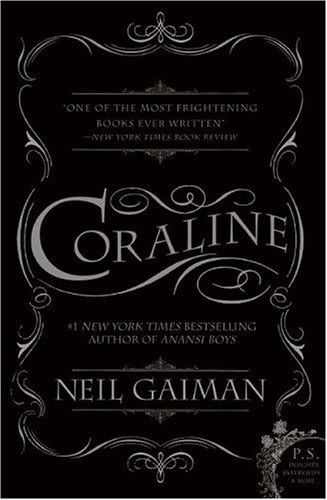
Due to the release of Henry Selick’s stop motion adaptation of Neil Gaiman’s Coraline, I figured that I aught to get a copy of the book and read it.
Although some parents have argued about whether Gaiman’s darker writing is appropriate for kids, this book is not frightening. Coraline is most definitely a children’s book, even if you judge it solely by its length. My copy is a mere 162 pages long and didn’t take me long to read at all. Ignore any reviews describing this book as frightening or bone-chilling; the content may be slightly disturbing, but it’s not outright terrifying. There are many other popular adventure stories for children that are scarier than Coraline.
No doubt you’ve heard a summary of the book by now. A girl named Coraline finds a door to another world where her “other” parents are doting and involved in her life, but inevitably, everything falls apart and the “other” parents aren’t what they seem to be. Simple enough.
I really wish this wasn’t a children’s book. When I was reading through it, I felt that this story was the bare bones of an intensely disturbing and psychologically fascinating tale. I enjoyed it well enough, it is a very good story, but I wanted more. There are times when the book could have taken some truly dark turns, but it only hovered on the edge for a moment.
I wanted to push it off of that edge.
But then it wouldn’t be a children’s book, which would be unfortunate. I think there needs to be more books like this for kids. There weren’t any when I was a kid, which may be why I moved so quickly on to adult science fiction at such a young age.1
And, of course, every children’s book has to have a lesson or moral attached to it. Gaiman’s delivery of these ideas is so seamless that I only realized what they were a few days after reading it. You know that they’re there when you finish, but they aren’t directed to you in the lecturing tone that many children’s book adopt. And these lessons, in my opinion, are much better than the ones in those cutesy “safe” stories anyway.
One lesson is to be grateful for what you have. Coraline wanted a more exciting and dangerous life and she nearly lost her parents when she found it. She learned to appreciate her mundane little everyday adventures.
Another was to keep calm in a difficult situation. Coraline never panicked. She assessed the situation as calmly as possible and thought things through. This is one of the skills that allowed her to get through the situations.
But, perhaps the best lesson to teach to kids that isn’t often handled well by parents2, is that the world is dangerous. This book clearly outlines that monsters can disguise themselves as people and that some people are not to be trusted. People can be good and they can be bad and you might not always know which is which. You just try your best.
Overall, I thought this is a very good children’s book and I definitely recommend it to any youngsters out there. It’s got some fun and some danger, some real life and some fantasy, and it really engages you in the story.
1 At age eleven, I had finished everything in our small town library children’s section and was regularly reading Piers Anthony, who writes on a whole rainbow of adult themes. I am still baffled as to why my parents allowed this to occur.
2 I’m the oldest of four kids. I used to help run children’s reading programs at the local elementary school and public library. I was a scout leader. I was a babysitter. I worked with a lot of children and I saw some spectacularly inadequate parenting going on in my hometown.






2 comments:
I think I've read this book about seven or eight times. I entirely agree, many children books are far to tame.
@MagicalIdiotSquigoo
It's definitely a book worth reading that many times.
And children's books are getting better, I think. Coraline, A Series of Unfortunate Events, The Spiderwick Chronicles... They're all creeping into that dark place that children are familiar with and still work when you get older.
Post a Comment